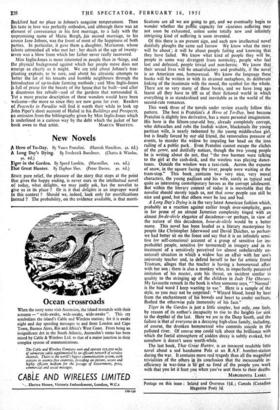New Novels
SINCE pure relief, the pleasure of the story that stops at the point that gives the happy ending, is never ours in the intellectual novel of today, what delights, we may justly ask, has the novelist to give us in its place ? Or is it that delights is an improper word in this context ? Should we, indeed, look only for mortifications Instead ? The probability, on the evidence available, is that morti-
fications are all we are going to get, and we eventually begin to wonder whether the public capacity for vicarious suffering may not soon be exhausted, unless some totally new and infinitely intriguing kind of suffering is soon invented.
Of this there is no present sign, and each new intellectual novel dutifully ploughs the same sad furrow We know what the story will be about; it will be about people failing and knowing that they have faded. We know what kind of people they will be, people in some way divergent from normalcy, people who feel lost and defeated, people trivial and non-heroic. We know that their sexual lives will be unsatisfactory and probably, if the novel is an American one, homosexual. We know the language these books will be written in with its strained metaphors, its deliberate linking of the inanimate with the mood, the symbol for the whole. There are so very many of these hooks, and we have long ago learnt all they have to tell us of their fictional world in which everything is as standardised and inevitable as in the world of the second-rate romances.
This week three of the novels under review exactly follow this pattern. The best is Pratolini's A Hero of ,To-Day, best because Pratolini is slightly less derivative, has a more personal imagination. His hero is the fifteen-year-old boy, already completely corrupt, who debauches and robs the foolish widow, blackmails the young partisan wife, is nearly redeemed by the young middle-class girl. but is finally forced by our old friend, the remorseless pressure of events, to murder the widow by impaling her head on the iron railing of a public park. Even Pratolini cannot escape the clichés of the genre, and dutifully notices, though the two young people he is writing about do not, that "the two barmen were talking to the girl at the cash-desk, and the wireless was playing dance- tunes. Outside the window was a taxi-rank. Across the expanse of snow, in the square facing the river, people were waiting at the tram-stop." This book contains two very nice, very moral characters, the young partisan and his wife, surely as typical and quite as interesting contemporary heroes as the corrupt adolescent. But within the literary context of today it is inevitable that the novelist should sternly teach us, not that some people can still be nice and good, but that Others must be lost and bad.
A Long Day's Dying is in the very latest American fashion which. probably as a reaction against earlier tough over-simplicity, goes in for prose of an almost Jamesian complexity tinged with an almost fin-dc-siècle elegance of decadence—or perhaps, in view of the nature of this decadence, boue-de-siecle would be a better name. This novel has been lauded as a literary masterpiece by people like Christopher Isherwood and David Daiches, so perhanc we had better sit on the fence and say that it is an infinitely sensi- tive (or self-conscious) account of a group of sensitive (or im- probable) people, sensitive (or tormented) in imagery and in its treatment of a sensitively perceived for almost unbelievably un- natural) situation in which a widow has an affair with her son's university teacher and, to defend herself to her fat artistic friend Tristram, alleges that the teacher is having a homosexual affair with her son ; there is also a monkey who, in imperfectly perceived imitation of his master, cuts his throat, an incident similar in quality to the stringing up of the children in Jude The Obscure. My favourite remark in the book is when someone says, "' Normal' is the bad word I keep wanting to use." Here is a sample of the style, so you may not be surprised: "Wizard blood, lured by heat from the enchantment of his bowels and heart to cooler surfaces, flushed the otherwise pale immensity of his face."
Tiger in the Garden is just a little simpler, but only, one feels, by reason of its author's incapacity to rise to the heights (or sink to the depths) of the last. Here we are in the Deep South, and the failure is that of everyone in a decaying high-class family, including, of course, the drunken homosexual who commits suicide in the polluted river. Of course one could talk about the brilliance with which the foetid atmosphere of sodden 'decay is subtly evoked, but somehow it doesn't seem worth-while.
The last book, That Great Hunter. is an innocent readable little novel about a sad handsome Pole at an R.A.F. bomber-station during the war. It contains more real tragedy than all the magnified trivialities of the others in its conclusion that the inexcusable in- efficiency in war-time is 'to get so fond of the people you work with that you let it hurt you when you've sent them to their deaths.
MARGHANITA LASKI.


































 Previous page
Previous page